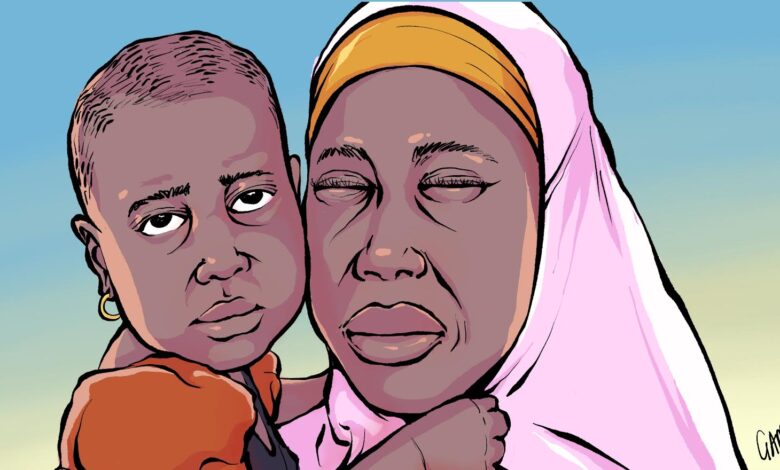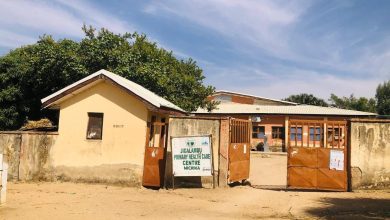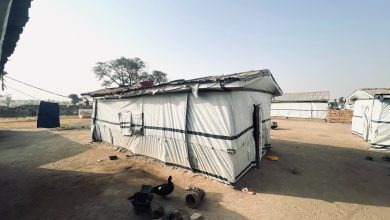A Blind Woman’s Search For Happiness
Married at the tender age of 14 in Adamawa, northeastern Nigeria, Habiba later lost her vision during a pregnancy. Refusing to adjust to her disability, her husband sent her packing. She has been struggling since.

When 31-year-old Habiba (surname withheld) was married off at the tender age of 14, she still had her sight.
Underage marriage, heinous as it is, was not uncommon at the time in Yola, northeastern Nigeria, where she is based, and so she enjoyed what she thought of as a stable marriage.
But things changed during her third pregnancy. By this time, she was 24.
“I started having an unusual headache every day and I thought it was a symptom of malaria or fever,” she said. This was in 2016. She then tried self-medication which proved futile. After a few weeks, her vision became blurry and she had no choice but to seek medical help. Unfortunately, it was too late – her vision was gone.
Habiba’s husband said he could not cope with her disability and so made the decision to divorce her, she narrated. He left her alone to face the world with their unborn child. She later gave birth successfully, but alone and blind, unable to afford medical care, the baby died after an illness. This incident haunted her.
In her quest for a fresh start, Habiba remarried, hopeful for happiness and stability. But life as it were, was soon to deal her a third blow. Two years later, she faced another heart-wrenching divorce. This time because she couldn’t conceive for her new husband.
“I was shattered and traumatised,” she said. “My only comfort was my mum and my children. I felt like a walking dead but I accepted it as fate.”
The plight of PwDs
According to the United Nations Department of Economic and Social Affairs (UN DESA), women with disabilities are faced with several challenges and are often vulnerable to abuse in a world where providing opportunities and support for the marginalised often seems to be a struggle. Their experiences usually include gender-based discrimination as well as additional barriers imposed by disability. On one hand of the spectrum, disabled women are faced with grappling with societal biases and on the other, they are faced with physical or cognitive limitations imposed by their disabilities.
In an article titled “No One is Listening; Experiences of Women with Disabilities in Nigeria during COVID-19”, United Nations Women cited limited access to education and quality healthcare, a heightened rate of vulnerability to violence and abuse as well as diminished economic opportunities as some of the challenges women with disabilities face. Thus, the very essence of their existence is a testament to resilience, as they strive to navigate the obstacles they encounter.
Research conducted by BMC Women’s Health sheds more light on the troubling reality faced by women with disabilities. These women are at a significantly higher risk of experiencing violence throughout their lifetime, nearly twice as likely compared to men with disabilities or individuals without disabilities. They also endure higher rates of all types of violence. This heightened vulnerability stems from factors related to disability, such as dependence on others for support, mistrust, and social and physical isolation.
Coping with adversity
Habiba eventually returned to her first husband after two years and gave birth to two more children, making them a total of four. However, her husband began to show little compassion or intimacy towards her. He had taken another wife who was unable to bear children, leading to constant conflict within the household. Habiba, despite the difficult circumstances, endured it all for the sake of her children.
One fateful day, her husband once again asked her to leave. Broken, she had no choice but to comply. She returned to her family in Jigawa, northwestern Nigeria only to find that life there wasn’t any easier. Eventually, she returned to Adamawa where her ex-husband resided and requested custody of her children.
Her husband refused.
It took the intervention of community leaders to persuade him to allow Habiba to stay with the children, primarily to assist with household chores. Habiba rented an apartment near his house, making it easier for the children to visit. To support herself and her children, she resorted to street begging. While her situation seemed bleak, she found solace in the kindness of strangers. People in her community became family, offering support and assistance whenever they could.
“My neighbours are good people and very compassionate. Whenever I come back from begging without any gains, they try to find something for me and the children to eat before going to bed,” she said.
To support her, a shop owner close to Habiba’s home gave her some packs of detergent, palm oil, food seasoning and other items to sell. So while she goes out to beg for alms with one of her children, the older one stays back to sell since they do not go to school.
Richard Bitrus, the chairman of the Persons With Disabilities (PWD) association who is also the Executive Director of the Richard Bisane Foundation, which works to provide support to people with disabilities, picked an interest in Habiba’s case. Earlier in February 2022, Habiba had found her way to their office located in Yola and explained her predicament. Unfortunately, the organisation is at its blooming stage and lacks the financial capacity to help her.
However, it offers her counselling sessions to keep her hope alive.
Obidah Habila Albert & Milcah Gaman are 2023 HumAngle Accountability Fellows.
Support Our Journalism
There are millions of ordinary people affected by conflict in Africa whose stories are missing in the mainstream media. HumAngle is determined to tell those challenging and under-reported stories, hoping that the people impacted by these conflicts will find the safety and security they deserve.
To ensure that we continue to provide public service coverage, we have a small favour to ask you. We want you to be part of our journalistic endeavour by contributing a token to us.
Your donation will further promote a robust, free, and independent media.
Donate HereStay Closer To The Stories That Matter




